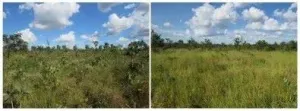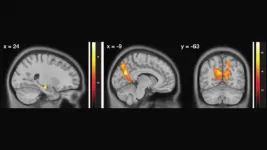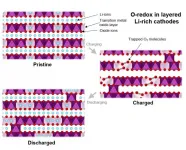(Press-News.org) Invasive alien species, defined as animals and plants that breed and disperse in a landscape beyond their native range, have negative environmental, social, and economic impacts. One example among many is the forage grass genus Brachiaria, originally African and introduced to Brazil to form cattle pasture. It has become a major threat to the survival of native species and biodiversity at several spatial scales.
Complete eradication of invasive species is often impracticable. Attempts to do so have had undesirable consequences and even been damaging because merely withdrawing an invasive species does not restore the original environment, as in the areas of Cerrado (Brazilian savanna) invaded by pines. Instead of eradication, therefore, the goal should be continuous management, according to many experts. This is the line taken by researchers from Brazil, Argentina, Chile, and the United Kingdom, who have agreed on a strategic approach focusing on impact mitigation rather than elimination.
They call their project CONTAIN Latam. The name refers to the impossibility of eradicating invasive non-native species and the need for containment of their growth and impacts.
The project resulted from a 2018 call for proposals issued under the aegis of a cooperation agreement involving FAPESP, the UK Natural Environment Research Council (NERC), UK Research and Innovation (UKRI), the Newton Fund, Argentina's National Scientific and Technical Research Council (CONICET), Chile's National Commission for Scientific and Technological Research (CONICYT), and Peru's National Council for Science, Technology and Technological Innovation (CONCYTEC).
The initiative aims at developing management tools to optimize the control of invasive species in the medium to long term. The Brazilian members of the group are affiliated with São Paulo State University (UNESP) and coordinated by Alessandra Fidelis, a professor in UNESP's Rio Claro Institute of Biosciences.
A study by the CONTAIN group is the subject of an article published recently in the journal BioScience. The study was supported by FAPESP via a research project for which Fidelis is principal investigator in Brazil.
"Our study set out not just to analyze invasive species but also to put forward guidelines for interaction with managers with the aim of containing proliferation of these species and mitigating their impacts," Fidelis told Agência FAPESP.
The full definition stated early on in the article is that invasive species "successfully transition the three initial invasion stages (transport, introduction, and establishment) and subsequently establish multiple self-sustaining populations composed of individuals that breed, survive and disperse in a landscape beyond their native range", and that a "subset" of invasive species produces an array of "negative environmental, social, and economic impacts at various spatial scales".
In this vast subset, the project focuses on the following: in Brazil, Brachiaria spp., Urochloa spp. and other grasses of African origin introduced as forage crops for cattle pasture, and pines (Pinus spp.) introduced from the northern hemisphere for reforestation and to produce pulp and resin; in Argentina, American mink (Neovison vison) introduced for fur production, pines, and privet (Ligustrum spp.), of Asian origin and introduced here as a street tree, hedge or ornamental plant; in Chile, pines, mink, and the Yellowjacket or German wasp (Vespula germanica) whose origin is hitherto unknown.
"We propose six criteria for planning to mitigate their impacts. The first three comprise a detailed survey of the situation: mapping their presence and spatial distribution, finding out how long each invasive species has been present and compiling the available data on their impacts," Fidelis said. "The next three relate to the recommended responses to the situation: the kinds of intervention that are technically, socially, and economically feasible, the potential negative consequences of these interventions, and a cost-benefit analysis of the interventions and their consequences."
The COVID-19 pandemic has shone a bright light on the risks of degrading the natural environment and the urgent need to implement science-based policies for controlling and mitigating these risks. "In the case of the species on which our study focused, there's a very strong additional reason for implementing such policies, as mink have been found to be transmitters of the novel coronavirus," Fidelis said.
All this will evidently be ineffectual unless the knowledge produced by universities and research institutions can cross over from academia to society in general, and especially to those responsible for managing public and private affairs.
INFORMATION:
About São Paulo Research Foundation (FAPESP)
The São Paulo Research Foundation (FAPESP) is a public institution with the mission of supporting scientific research in all fields of knowledge by awarding scholarships, fellowships and grants to investigators linked with higher education and research institutions in the State of São Paulo, Brazil. FAPESP is aware that the very best research can only be done by working with the best researchers internationally. Therefore, it has established partnerships with funding agencies, higher education, private companies, and research organizations in other countries known for the quality of their research and has been encouraging scientists funded by its grants to further develop their international collaboration. You can learn more about FAPESP at http://www.fapesp.br/en and visit FAPESP news agency at http://www.agencia.fapesp.br/en to keep updated with the latest scientific breakthroughs FAPESP helps achieve through its many programs, awards and research centers. You may also subscribe to FAPESP news agency at http://agencia.fapesp.br/subscribe.
Too much activity in the hippocampus may cause navigation impairments seen in aging adults, according to new research published in JNeurosci.
Spatial navigation is one of the cognitive abilities that declines sharply in old age. Older adults often have difficulty navigating new environments and will choose to stick with familiar ones. Plus, key regions in the brain's navigation circuit are some of the first affected by Alzheimer's disease. In a recent study, Diersch et al. examined the neural mechanism behind this decline in spatial learning.
In the study, younger ...
A single letter difference in a single gene, inherited from both parents, spells a lifetime of anemia and pain for 20 million people, mostly of African ancestry, worldwide. Sickle cell disease (SCD) causes red blood cells to assume a sickle shape and jam in capillaries, cutting off oxygen to lungs, brain, bones and other organs. Despite the single genetic origin of SCD, each person's disease experience and even life expectancy depend upon where they live, and the social, physical and environmental factors they encounter.
Now, a new review published by Wiley in the journal Advanced Genetics proposes that it is ...
The rapid loss of variation within species is a hidden biodiversity crisis, according to the authors of a new study looking at how this variation supports essential ecological functions and the benefits nature provides for people.
Published March 1 in Nature Ecology and Evolution, the study highlights the need to better understand and conserve variation within species in order to safeguard nature's contributions to people.
"Biodiversity means more than the number of species, and when we focus on species-level extinctions we are missing part of the story," said corresponding author Eric Palkovacs, professor of ecology and evolutionary biology at UC Santa Cruz. "Intraspecific variation is a neglected aspect of biodiversity, ...
ITHACA, N.Y. - The expansion of charter schools in the 2000s led to an increase in school segregation and a slight decline in residential segregation, according to new research from Cornell University providing the first national estimates of the diverging trends.
According to the study, the average district to expand charter school enrollment between 2000 and 2010 experienced a 12% increase in white-Black school segregation and a 2% decrease in white-Black residential segregation.
The patterns moved in opposite directions, the research found, because charter ...
Scientists from the Stanley Manne Children's Research Institute at Ann & Robert H. Lurie Children's Hospital of Chicago found that a region within the DNA of the cancer-promoting GLI1 gene is directly responsible for regulating this gene's expression. These findings, published in the journal Stem Cells, imply that this region within GLI1 could potentially be targeted as cancer treatment, since turning off GLI1 would interrupt excessive cell division characteristic of cancer.
"From previous research, we know that GLI1 drives the unrelenting cell proliferation that is responsible for many cancers, and that this gene also stimulates its own expression," says co-senior author Philip Iannaccone, MD, PhD, Professor Emeritus at the Manne Research Institute at Lurie Children's and Northwestern ...
Scientists from Far Eastern Federal University (FEFU) together with Russian and German colleagues, continue studying antitumor compounds synthesized based on bioactive molecules isolated from a sea sponge. One of them fights cancer cells resistant to standard chemotherapy, and at the same time has an interesting dual mechanism of action. A related article appears in Marine Drugs.
Scientists have tested the biological effect of the marine alkaloid 3,10-dibromofascaplysin on various prostate cancer cells, including those resistant to standard docetaxel-based chemotherapy. ...
CORVALLIS, Ore. - In tropical oceans, a combination of sunlight and weak winds drives up surface temperatures in the afternoon, increasing atmospheric turbulence, unprecedented new observational data collected by an Oregon State University researcher shows.
The new findings could have important implications for weather forecasting and climate modeling, said Simon de Szoeke, a professor in OSU's College of Earth, Ocean, and Atmospheric Sciences and the lead author of the study.
"The ocean warms in the afternoon by just a degree or two, but it is an effect that has largely been ignored," said de Szoeke. ...
HARWELL, UK (1 March 2021) Scientists based at the University of Oxford as part of the Faraday Institution CATMAT project researching next-generation cathode materials have made a significant advance in understanding oxygen-redox processes involved in lithium-rich cathode materials. The paper, published in Nature Energy, proposes strategies that offer potential routes to increase the energy density of lithium-ion batteries.
"In the ever more difficult quest to make incremental improvements to Li-ion battery energy density, being able to harness the potential of oxygen-redox cathodes and the bigger improvements they offer relative to the nickel rich cathodes in commercial use today is potentially significant," Prof Peter Bruce, University ...
Childhood cancer and its treatment can result in cognitive struggles. Scientists atSt. Jude Children's Research Hospital are studying the risk factors. They looked at social and economic issues in children with brain tumors treated with radiation.
These patients have the greatest risk of cognitive problems. Scientists followed a group of St. Jude patients for 10 years. The children all had conformal radiation therapy.
For each patient, researchers looked at certain factors. These included the parent's job, education level, and whether it was a single parent home. The children were from different backgrounds.
The findings show social and economic status is linked to IQ, academics, attention ...
Amsterdam, March 1, 2021 - Comfort is a daily human experience central to the perception of our environment and the continuous processing of sensory input. Environmental factors such as smell, temperature and light can influence comfort, as can our interaction with products, such as the design of a chair or a mattress. Increasingly, researchers investigating the science of comfort and discomfort are focusing on the role of human behavior. A special supplement to the journal WORK presents the latest advances, from optimal seat design in offices and transportation to the influence of smell on comfort and the interaction between time and comfort.
"This special supplement adds unique findings to comfort knowledge. ...







